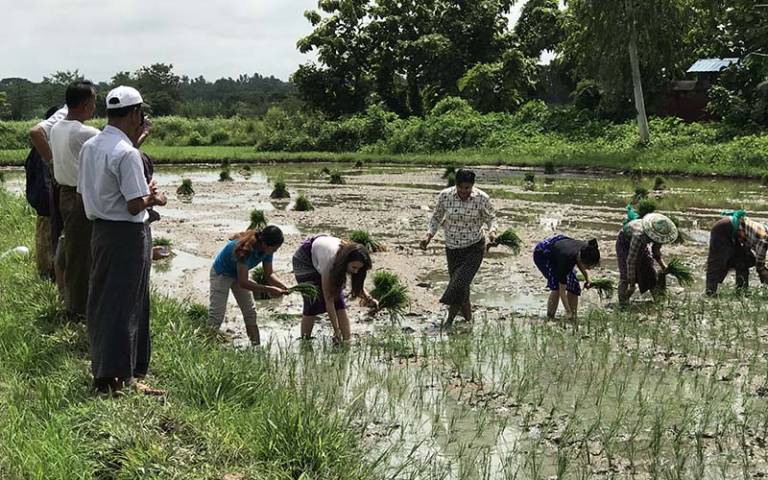UCL alumni tackle food poverty with ‘world’s first sustainable rice brand’
Social enterprise Rice Inc works with over 200 farmers in Southeast Asia to eliminate food waste, promote sustainability and bring food security.

15 November 2021
Rice Inc design, manufacture, and deploy cost-effective post-harvest farming equipment to small holder rice farmers so they can move away from using traditional wasteful practices.
The company has now launched ‘the world’s first sustainable rice brand’, Paddi, supplying some of the world's largest caterers and world class chefs. The ‘Paddi Way’ has a 50% smaller carbon footprint compared with traditional and organic rice, a 20% reduction in water usage, and increases smallholder farmer income by 10%.
The rice supply chain
Rice Inc was founded in 2017 by UCL students Kisum Chan and Lincoln Lee (BSc Biomedical Sciences) along with two other students.
Through their research, they found that hundreds of millions of tonnes of rice goes to waste every year in Southeast Asia because of inadequate post-harvest rice drying practices. With spoilage rates of up to 30%, farmers are not reaching their full earning potential and are often living in poverty. Simultaneously, food that could be feeding the world’s ever-growing population is going to waste.
Many Southeast Asian rice farmers cannot afford the drying technology needed to reduce rice wastage. So Kisum and Lincoln came up with the idea for a social business that provides access to this technology.
Rice Inc builds leading-edge eco-dryers on farmers’ land, enabling farmers to dry their rice for a service fee. They then help farmers to store the rice, wait for off-peak prices and sell the rice. Working in collaboration with the International Rice Research Institute (IRRI), Rice Inc increases the value of farmers’ rice harvests and generates maximum prices for the rice.
Journey to the $1 million Hult Prize
In 2017 Kisum, Lincoln and two other students applied for the Hult Prize, a UN-backed platform for the creation and launch of sustainable startups emerging from universities.
To help them prepare for the competition, UCL Innovation & Enterprise provided mentorship. They also provided financial assistance to enable the student entrepreneurs to attend the Hult Prize Summer Accelerator. The team also received expert guidance on pitching and other business skills from UCL Innovation & Enterprise and the UCL Business Society. The UCL Entrepreneurs Society VC Fund provided Rice Inc with non-equity seed capital.
Rice Inc CEO Lincoln Lee said: “The very people growing rice are the ones left behind by the industry and society. We wanted to change that and, thanks to the support we received from UCL, we were able to develop an idea that could transform society in Southeast Asia.”
The Rice Inc team beat 200,000 other ideas to win a chance to pitch at the Hult Prize global finals. In September 2018, they won the $1 million prize, which was presented by Bill Clinton at the UN. The seed funding has allowed Rice Inc to expand beyond their pilot schemes in Malaysia and Myanmar. The eventual goal is to end food poverty in Southeast Asia.
Supplying rice to communities globally
Rice Inc has now launched what it believes is the world’s first sustainable rice brand, Paddi. They are producing three rice products - basmati, jasmine and sushi – and supplying some of the world's largest caterers and world class chefs. They also sell direct to consumers through their website.
Previously the company partnered with multinational food services company Sodexo to offer ethical rice in UCL’s Refectory. This partnership between Rice Inc and Sodexo was facilitated by UCL Innovation & Enterprise and UCL Estates.
UCL Innovation & Enterprise continues to support Rice Inc. The startup is now resident at UCL’s entrepreneurship hub, BaseKX, where the team benefits from free office space, advice and mentoring. Notably, while at BaseKX, Kisum and Lincoln were supported in obtaining a Tier 1 Entrepreneur visa, meaning they could continue growing the company in the UK after graduating.
During the COVID-19 pandemic, Rice Inc could not sell their rice to businesses that were closed. So they launched Rice Up to help the local communities where they were based. For every bag of rice purchased, the campaign donated another to a food charity.
Kathryn Walsh, Executive Director at UCL Innovation & Enterprise paid tribute to Rice Inc. She said:
“UCL has a thriving entrepreneurial ecosystem, which importantly, includes social enterprises that are having a tangible impact at the global level. Rice Inc is perhaps unique in addressing several UN Sustainable Development Goals at once. These include Zero Hunger, Decent Work and Economic Growth, Responsible Consumption and Production, and Climate Action. We need to foster more ventures like Rice Inc, if we're to create a better, more sustainable future for everyone.”
Links
Find out more about:
- entrepreneurship support for UCL students and recent graduates
- UCL Business Society
- Rice Inc
- Hult Prize
Photos supplied by Rice Inc
 Close
Close

